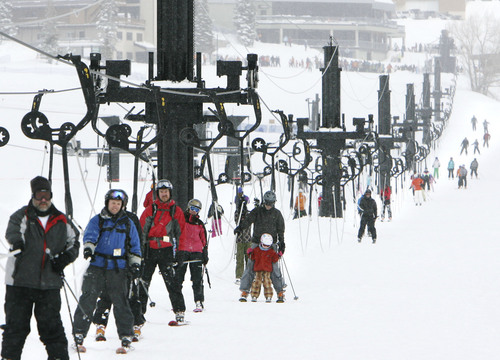This is an archived article that was published on sltrib.com in 2014, and information in the article may be outdated. It is provided only for personal research purposes and may not be reprinted.
A group of snowboarders is suing Alta ski resort, claiming its no-snowboards policy violates their constitutional rights.
"Alta's snowboarding prohibition was initiated as a result of animus ... towards the type of people they believed to be 'snowboarders,'" claims the lawsuit, filed Wednesday in federal court.
The snow sports advocacy group Wasatch Equality joined snowboarders Rick Alden, Drew Hicken, Richard Varga and snowboarding pro Bjorn Leines in the lawsuit against Alta and the U.S. Forest Service.
On Jan. 12, a group of snowboarders, including Alden, Hicken and Varga, bought tickets at Alta and tried to ride the Collins lift with their boards; instead ski patrol escorted them away, the lawsuit claims. When Alden got onto a lift using a split board — a snowboard that separates down the middle for cross-country travel and reattaches for downhill travel — patrollers intercepted him at the top of the lift.
Meanwhile, an array of ski equipment was allowed, including one mono-ski — "simply a single board nearly identical to a snowboard in shape and size but with feet facing forward," the complaint states.
The lawsuit notes that three resorts in North America ban snowboarding: Alta, Deer Valley and Mad River Glen in Vermont. But only Alta is on public lands.
The ban "excludes snowboarders from use and enjoyment of the public land on which Alta operates," the lawsuit claims.
Snowboarders in the 1980s were seen as an "immature, inexperienced and reckless" counterculture by skiing sophisticates, the lawsuit states, but as snowboarding gradually was accepted as a standard winter sport, "most resorts soon acknowledged that there was no legitimate reason to prohibit snowboarding." However, "outdated or outright discriminatory perceptions and attitudes continued among some skiers, which infected or was exploited by some resorts that wanted to prevent snowboarders and their 'counterculture' from having a presence on their mountain," the lawsuit states.
Even if Alta itself did not hold animus toward snowboarders, it "serves as a conduit for the animus of its customers," the complaint alleges, pointing to Youtube videos of Alta skiers claiming on film or in comments that snowboarders are "the worst," "young and stupid," "airheads," and "a bunch of idiots," with several proclaiming, "I hate snowboarders."
By last winter, snowboarders made up about 40 percent of the total population of skiers and snowboarders, the lawsuit claims.
By banning snowboarders, Alta is depriving them of access to the resort with the most snow and some of the best terrain in Utah, the lawsuit claims. It also "hurts Utah tourism and, by excluding mixed-skier/snowboarder families, flies in the face of Utah's family values," the suit states.
The suit points to language in Alta's Forest Service permit requiring that "the lands and waters covered by this permit shall remain open to the public for all lawful purposes."
The ban on snowboards violates snowboarders rights under the Equal Protection Clause of the U.S. Constitution, the snowboarders argue, and with no rational basis.
"The only difference between [skiing and snowboarding] is the orientation of a person's feet on the skis or board," the lawsuit states. "Alta allows a broad range of equipment ... as long as the particular device is referred to as a 'ski.'"
Kathy Jo Pollock, a spokeswoman for the U.S. Forest Service, said attorneys had not reviewed the lawsuit and she could not comment on pending litigation.
Officials at Alta could not be reached for comment.



